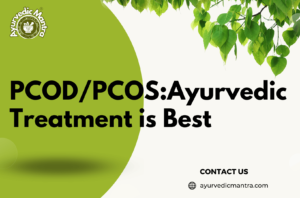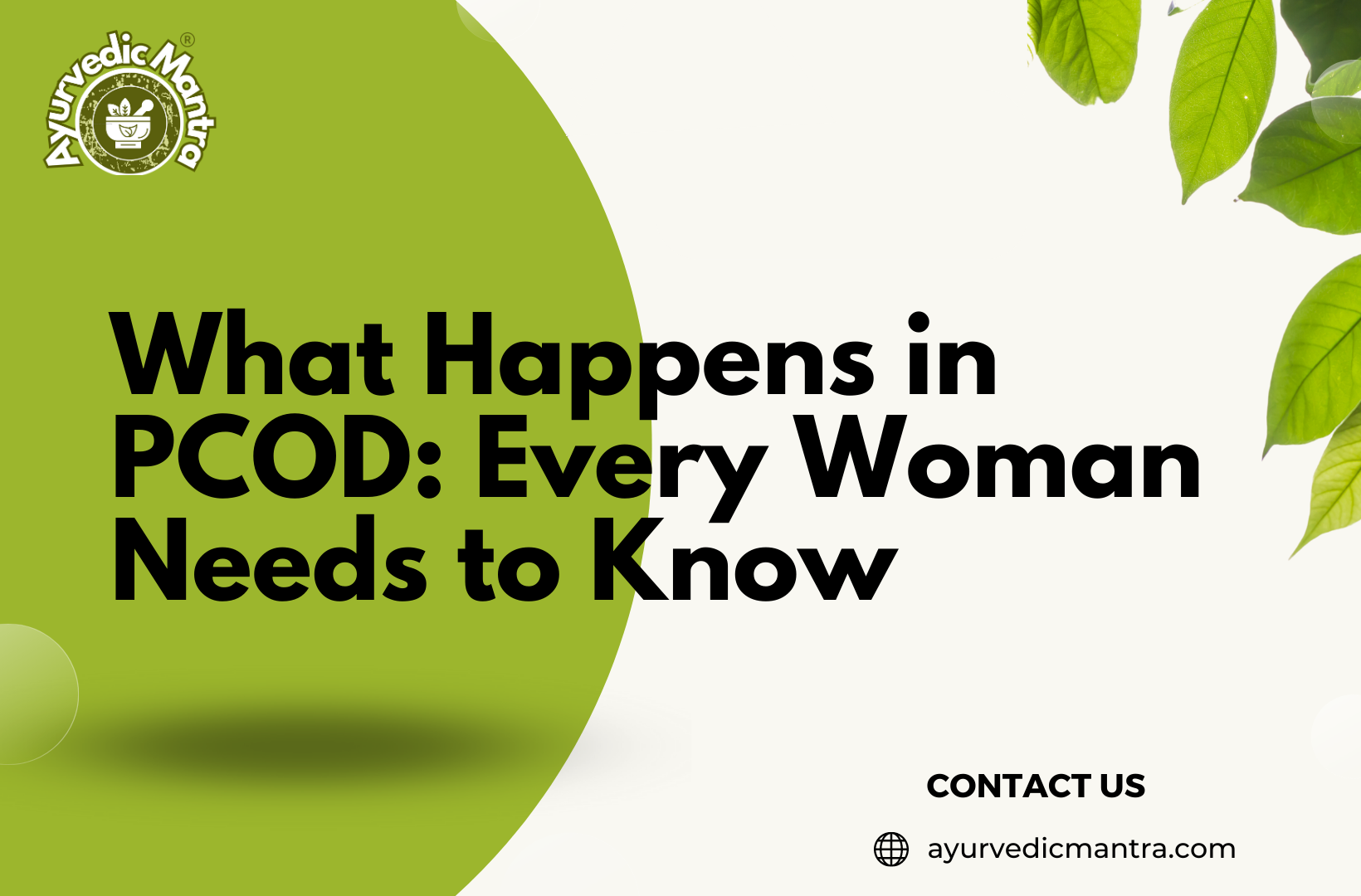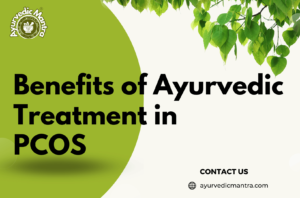
PCOD/PCOS: Ayurvedic Treatment is Best
Introduction Polycystic Ovary Disorder (PCOD) or Polycystic Ovary Syndrome (PCOS) is a common endocrine disorder affecting millions of women worldwide. It leads to hormonal imbalances,

Polycystic Ovary Syndrome (PCOS), commonly known as PCOD (Polycystic Ovary Disorder), is a hormonal disorder that affects millions of women worldwide. This complex condition can lead to various physical, emotional, and reproductive challenges. This informative article aims to provide a comprehensive overview of PCOD, including its causes, symptoms, diagnosis, treatment options, and lifestyle management.
PCOD is characterized by an imbalance of hormones in a woman’s body, particularly insulin and androgens (male hormones). This hormonal imbalance disrupts the normal functioning of the ovaries, leading to the formation of tiny cysts on the ovaries. Although called “cysts,” these cysts are actually follicles that have not matured or ovulated properly.
The exact cause of PCOD is not fully understood, but a combination of genetic and environmental factors is believed to play a role. Insulin resistance, where the body’s cells do not respond appropriately to insulin, significantly contributes to PCOD. Additionally, elevated androgen levels contribute to the characteristic symptoms of PCOD, such as excessive hair growth and acne.
Lifestyle Management: A holistic approach is crucial for managing PCOD. This includes:
PCOD is a common hormonal disorder that affects many aspects of a woman’s life. By understanding its causes, symptoms, and treatment options, women can take proactive steps to manage their health effectively. Through lifestyle changes, medical interventions, and emotional support, women with PCOD can lead fulfilling lives and navigate the challenges posed by this condition. Remember, early diagnosis and consistent management are crucial to minimizing the impact of PCOD on your overall well-being.
Frequently Asked Questions (FAQs) about Polycystic Ovary Syndrome (PCOS)
Polycystic Ovary Syndrome (PCOS) is a hormonal disorder characterized by imbalances in insulin and androgen levels in a woman’s body. It can lead to irregular menstrual cycles, excessive hair growth, weight gain, acne, and fertility issues due to disrupted ovulation.
The exact cause of PCOS is not fully understood, but it is believed to involve genetic and environmental factors. Insulin resistance and elevated androgen levels play a significant role in the development of various symptoms.
Diagnosis involves a combination of medical history, physical examination, and laboratory tests. Blood tests measure hormone levels, and ultrasounds visualize the ovaries and identify cysts or follicles that have not matured properly.
Common symptoms include irregular or absent periods, hirsutism (excessive hair growth), acne, weight gain, and fertility challenges. Some women may also experience oily skin, male-pattern baldness, and darkening of the skin in certain areas.
Yes, PCOS is a leading cause of female infertility. Irregular ovulation, often associated with PCOS, can hinder the release of eggs needed for conception. However, with proper medical intervention and lifestyle changes, many women with PCOS can improve their fertility.
Treatment approaches include lifestyle changes, medications, and in some cases, surgical interventions. Lifestyle changes focus on a balanced diet, regular exercise, and stress reduction. Medications such as hormonal birth control, anti-androgens, and ovulation-inducing drugs are commonly prescribed. Surgical options like ovarian drilling may also be considered.
Currently, there is no cure for PCOS. However, effective management strategies can help control symptoms and improve quality of life. Early diagnosis and consistent treatment can significantly reduce the impact of PCOS on a woman’s health.
PCOS is associated with an increased risk of several health concerns, including type 2 diabetes, heart disease, and endometrial (uterine lining) abnormalities. Regular medical check-ups and proactive health management are essential for minimizing these risks.
Absolutely. Adopting a healthy lifestyle by maintaining a balanced diet, engaging in regular physical activity, managing stress, and getting sufficient sleep can positively impact insulin sensitivity, hormone levels, and overall well-being for women with PCOS.
Many support groups, online forums, and healthcare professionals specialize in PCOS management. These resources provide information, guidance, and a sense of community for women dealing with PCOS-related challenges.
PCOS symptoms can improve during pregnancy due to hormonal changes. However, working closely with a healthcare provider is essential to monitor and manage any potential complications, such as gestational diabetes.
PCOS can have significant emotional and psychological effects. Physical symptoms and challenges related to fertility and body image can impact a woman’s mental well-being. Seeking emotional support and counseling can be beneficial.
PCOS can manifest during adolescence and puberty. It may lead to irregular periods, excessive hair growth, and emotional challenges during a crucial developmental stage. Early diagnosis and management are essential to support healthy physical and emotional development.
Absolutely. With proper medical care, lifestyle adjustments, and emotional support, women with PCOS can manage their condition effectively and lead active, fulfilling lives. Open communication with healthcare providers and a proactive approach to health management is critical.
Yes, PCOS symptoms can evolve. Some women may experience changes in symptoms, such as menstrual regularity, as they age or undergo certain life events. Regular medical check-ups help monitor these changes and adjust treatment accordingly.
Remember, each individual’s experience with PCOS is unique. If you suspect you have PCOS or are experiencing symptoms, it’s essential to consult a qualified healthcare professional for accurate diagnosis and personalized guidance.

Introduction Polycystic Ovary Disorder (PCOD) or Polycystic Ovary Syndrome (PCOS) is a common endocrine disorder affecting millions of women worldwide. It leads to hormonal imbalances,

Introduction Losing weight is a journey that requires dedication, consistency, and self-care. While there are numerous weight loss techniques out there, not all of them

Polycystic Ovary Syndrome (PCOS) is a hormonal disorder that affects millions of women worldwide. It can lead to various health complications, such as irregular periods,

In recent years, Ayurveda, an ancient system of natural healing originating from India, has gained significant popularity as an alternative approach to treating various health

आजकल वजन बढ़ने और चर्बी की वृद्धि होने की समस्या एक आम समस्या बन गई है। बढ़ते वजन और अतिरिक्त चर्बी के कारण न केवल

प्रस्तावना: आजकल वजन बढ़ने और ओबेसिटी की समस्या एक आम समस्या बन गई है। बढ़ते वजन के कारण न केवल शारीरिक समस्याएं होती हैं, बल्कि
